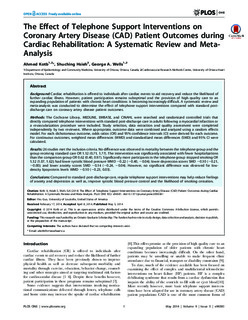| dc.contributor.author | Kotb, A. | |
| dc.contributor.author | Hsieh, S. | |
| dc.contributor.author | Wells, G.A. | |
| dc.date.accessioned | 2018-02-26T12:38:02Z | |
| dc.date.available | 2018-02-26T12:38:02Z | |
| dc.date.issued | 2014 | |
| dc.identifier.citation | Kotb, A., Hsieh, S. & Wells, G. A. (2014). The Effect of Telephone Support Interventions on Coronary Artery Disease (CAD) Patient Outcomes during Cardiac Rehabilitation: A Systematic Review and Meta-Analysis. PLoS ONE, 9(5). | nb_NO |
| dc.identifier.uri | http://hdl.handle.net/11250/2487008 | |
| dc.description.abstract | Background: Cardiac rehabilitation is offered to individuals after cardiac events to aid recovery and reduce the likelihood of further cardiac illness. However, patient participation remains suboptimal and the provision of high quality care to an expanding population of patients with chronic heart conditions is becoming increasingly difficult. A systematic review and meta-analysis was conducted to determine the effect of telephone support interventions compared with standard postdischarge care on coronary artery disease patient outcomes.
Methods: The Cochrane Library, MEDLINE, EMBASE, and CINAHL were searched and randomized controlled trials that directly compared telephone interventions with standard post-discharge care in adults following a myocardial infarction or a revascularization procedure were included. Study selection, data extraction and quality assessment were completed independently by two reviewers. Where appropriate, outcome data were combined and analyzed using a random effects model. For each dichotomous outcome, odds ratios (OR) and 95% confidence intervals (CI) were derived for each outcome. For continuous outcomes, weighted mean differences (WMD) and standardized mean differences (SMD) and 95% CI were calculated.
Results: 26 studies met the inclusion criteria. No difference was observed in mortality between the telephone group and the group receiving standard care OR 1.12 (0.71, 1.77). The intervention was significantly associated with fewer hospitalizations than the comparison group OR 0.62 (0.40, 0.97). Significantly more participants in the telephone group stopped smoking OR 1.32 (1.07, 1.62); had lower systolic blood pressure WMD 20.22 (20.40, 20.04); lower depression scores SMD 20.10 (20.21, 20.00); and lower anxiety scores SMD 20.14 (20.24, 20.04). However, no significant difference was observed for lowdensity lipoprotein levels WMD 20.10 (20.23, 0.03).
Conclusions: Compared to standard post-discharge care, regular telephone support interventions may help reduce feelings of anxiety and depression as well as, improve systolic blood pressure control and the likelihood of smoking cessation. | nb_NO |
| dc.publisher | PLoS ONE | nb_NO |
| dc.rights | Navngivelse 4.0 Internasjonal | * |
| dc.rights.uri | http://creativecommons.org/licenses/by/4.0/deed.no | * |
| dc.subject | telephone support interventions | nb_NO |
| dc.subject | Coronary Artery Disease | nb_NO |
| dc.subject | CAD | nb_NO |
| dc.subject | cardiac rehabilitation | nb_NO |
| dc.subject | pasientforløp | nb_NO |
| dc.title | The Effect of Telephone Support Interventions on Coronary Artery Disease (CAD) Patient Outcomes during Cardiac Rehabilitation: A Systematic Review and Meta-Analysis | nb_NO |
| dc.type | Journal article | nb_NO |
| dc.source.volume | 9 | nb_NO |
| dc.source.journal | PLoS ONE | nb_NO |
| dc.source.issue | 5 | nb_NO |
| dc.identifier.doi | https://doi.org/10.1371/journal.pone.0096581 | |

